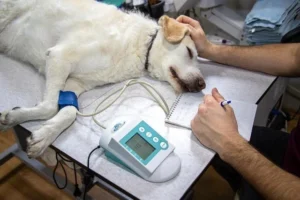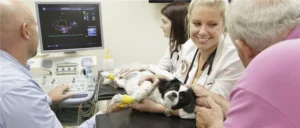Nestled in the heart of Renton, WA, Happy Tails Animal Hospital stands as a bulwark against the myriad threats to pet health, with heartworm disease being among the most insidious. Under the stewardship of Dr. Arshdeep Mann, the hospital champions the cause of preventive pet healthcare, with a particular emphasis on the battle against heartworms. This guide aims to arm pet owners with crucial knowledge and strategies to prevent this dangerous parasite from compromising their beloved pets’ health and happiness.
Unraveling the Threat of Heartworm Disease
Heartworm disease, caused by the parasite Dirofilaria immitis, is transmitted through the bite of an infected mosquito. This condition can afflict dogs, cats, and ferrets, but dogs are natural hosts, making them particularly vulnerable to severe disease and even death if left untreated. Heartworms reside in the heart, lungs, and associated blood vessels of infected animals, leading to severe lung disease, heart failure, organ damage, and potentially death.
Recognizing the Risk
The risk of heartworm disease is not confined to any specific region; it’s a nationwide concern, exacerbated in areas with warmer climates where mosquito populations thrive year-round. Renton, WA, with its varied climate, is not exempt from this threat. The migratory patterns of birds, combined with increasing pet travel, have facilitated the spread of heartworm disease, making prevention crucial for all pets, regardless of their geographic location.
The Prevention Paradigm
Preventive measures against heartworm disease revolve around regular administration of prophylactic medication, environmental management to reduce mosquito exposure, and ongoing education for pet owners. Dr. Mann emphasizes the importance of a multi-faceted approach to heartworm prevention, including:
1. Year-Round Preventive Medication:
The cornerstone of heartworm prevention is the regular use of FDA-approved heartworm preventives, available in various forms such as oral tablets, topical medications, and injectables. These medications are effective and safe when used as directed by your veterinarian.
2. Routine Testing:
Annual heartworm testing is recommended for all pets, even those on regular preventive medication. Early detection is key to managing and treating heartworm disease, should it occur. Exams at Happy Tails include a comprehensive health check that can detect signs of heartworm disease.
3. Mosquito Control:
Reducing your pet’s exposure to mosquitoes is an important complementary strategy. This includes measures such as removing standing water where mosquitoes breed, using mosquito repellents (as recommended by your veterinarian), and keeping pets indoors during peak mosquito activity times.
The Role of Happy Tails Animal Hospital
Happy Tails Animal Hospital, under the guidance of Dr. Arshdeep Mann, is at the forefront of heartworm prevention. The hospital’s approach includes:
- Education: Providing pet owners with the knowledge to understand the risks and signs of heartworm disease.
- Prevention: Offering the latest and most effective heartworm prevention products.
- Testing: Conducting thorough heartworm testing as part of annual wellness exams.
- Treatment: Advising on treatment protocols for pets diagnosed with heartworm disease.
Embracing Prevention: A Call to Action
The journey to a heartworm-free life for pets begins with a commitment to prevention. Dr. Mann and the team at Happy Tails Animal Hospital are your partners in this endeavor, offering expert advice, support, and the latest in heartworm prevention and care. By adopting a proactive approach to heartworm prevention, pet owners can significantly reduce the risk of their pets falling prey to this preventable disease.
For more information on heartworm prevention, or to schedule an appointment for your pet, contact Happy Tails Animal Hospital at 425-254-2779. Together, we can ensure the health and happiness of your furry family members for years to come.
Sources:
- American Heartworm Society (AHS): Provides comprehensive information on heartworm disease, including guidelines for prevention, diagnosis, and treatment.
- Centers for Disease Control and Prevention (CDC): Offers educational resources about heartworm disease and its transmission through mosquitoes.
- Journal of the American Veterinary Medical Association (JAVMA): Features research articles and studies on the latest advancements in heartworm prevention, diagnosis, and treatment.





